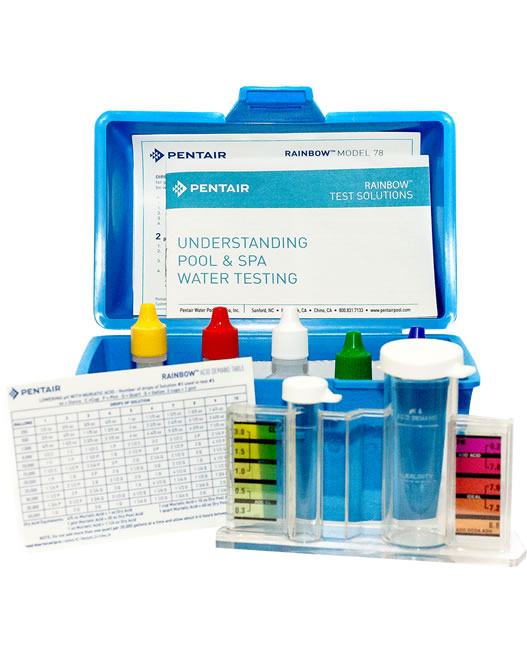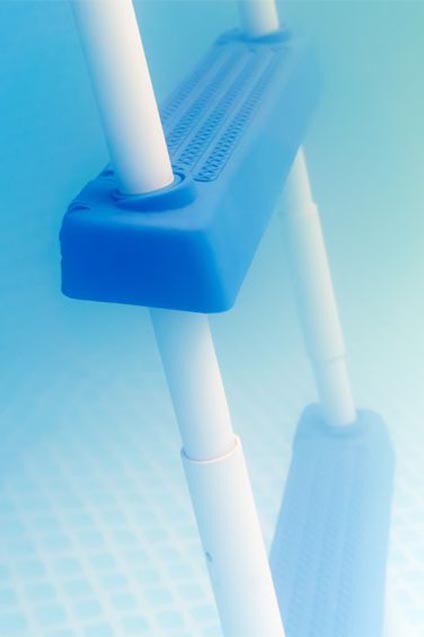
Algae Control
NOTE: Despite a high chlorine reading, if algae continues to occur, it is possible that there is too much stabilizer (cyanuric acid) in the pool water which impedes with the chlorine to take effect.
GREEN ALGAE
- Common kind of algae found in swimming pools
- Green algae commonly appears after heavy rainstorms because rainstorms provide nitrogen, which serves as food for the algae.
Not only does the nitrogen feed the green algae, it also destroys remaining chlorine through the formation of combined chlorine. A cloudy green appearance in the pool water may also be caused by green algae.
Preventing the occurrence of green algae could be done by including the regular use of algaecide in the pool’s normal maintenance program. Prevention of algae is easier and more helpful than to remove it once it occurs. In the case that algae occurs, treat it immediately. Prolonged presence of algae will be more difficult and expensive to treat.
YELLOW OR MUSTARD ALGAE
- Lacking chlorophyll (green pigment) which causes its yellow color
- Much slower growing than green algae
Yellow algae is quite difficult to spot as it only appears after a couple of weeks it has been living in the pool. It grows in a slow pace, therefore making it hard to eliminate. The lack of chlorophyll causes the yellow algae to develop and grow in shady or unlit areas of the pool such as plumbing fixtures and filters.
BLACK ALGAE
- The least manageable algae
Among all types, black algae is the easiest to prevent.
To control or limit the existence of black algae:
1. Regulate or adjust any problems in the circulation pattern of the pool.
2. Brush the wax-like coat protecting the algae colonies.
3. Add an algaecide.
4. Consistently brush the colonies daily to remove dead cells from the exterior areas. This will help in making sure that the living cells will be exposed to the algaecide.
These steps will not only eliminate the black algae; but also decrease the chances of the black algae to recur in the pool.
Cloudy Water
Test the chemical composition of water:
Free chlorine 1-3 ppm(parts per million)
pH: 7.2-7.6
Total Alkalinity: 90-120 ppm. (Products such as pristine blue requires a total alkalinity of 80 ppm)
Calcium hardness: 200-350 ppm
If the chemical composition is not within the suggested range, adjust the chemical balance and run your pool filtration system for 12-24 hours before retesting the cloudy pool water.
There are many reasons for cloudy pool water: early algae growth, lack of sunlight in the pool (UV sunlight acts as a natural anti-oxidant), pool circulation, not using the pool regularly, less filtration time, pool chemical balances etc. You should first eliminate these issues before using water clarifying products.

SWIMMING POOL TIPS & ADVICES
Causes: Often caused by a high pH or insufficient sanitation which results in algae growth.
Remedy: ‘Shock’ pool water with chlorine. Dosage depends on chlorine type. Correct pH to read between 7.2 – 7.6 with Dry Acid or Soda Ash. Add algaecide the following morning (see container for proper dosage).
Causes: Low pH; when chlorine is added it reacts with the water causing the iron in the water, which is normally present but cannot be seen, to come out and become visible. This can also cause brown stains on walls and floor.
Remedy: Lower chlorine level (withdraw chlorine treatment until the chlorine level measures below 0.5 ppm). Adjust pH to read between 7.2-7.6 and add alum. This removes the iron from the water by precipitation. Correct the pH, and then vacuum to remove the resulted dirt from the pool floor.
Causes: Hot days with high humidity or thunderstorms, also insufficient sanitation and brushing.
Remedy: Brush vigorously. Thereafter, add a bottle of algaecide in the morning. Shock pool in the late afternoon with 4 times the normal recommended dose of chlorine and brush again.
Causes: Usually due to insufficient sanitation.
Remedy: Correct pH. Brush the algae off the walls. Add algaecide following instructions on the bottle. Then shock dose with chlorine in the late afternoon and brush once more.
Causes: Insufficient sanitation and general neglect of pH testing and brushing.
Remedy: Brush vigorously with a stiff or Stainless Steel Brush if marble or with a very hard polypro Algae Brush if on a painted surface. Add a bottle of algaecide carefully following instructions. ‘Shock’ pool with chlorine for next the 2 days in the late afternoon. Ensure correct pH prior to any chemical treatment.
Causes: Build-up of chloramines, which are the waste products of spent chlorine and that have the classic chlorine smell.
Remedy: ‘Shock’ pool with about 3 – 5 times normal recommended dose of Chlorine.
Causes: Fine matter in suspension in the water – too small to be trapped in the sand filer.
Remedy: Backwash filter and pour alum into the weir of the pool. The flocculant will coagulate the small particles, which in turn will be trapped in the sand.
Causes: Normally caused if the pH of pool water is too low (acidic).
Remedy: Add Soda Ash in small doses.
Causes: (1) if the reading is high then the filter is clogged and needs backwashing. (2) if low, then the weir or pump baskets are clogged with leaves or debris.
Remedy: (1) backwash filer (2) switch off motor and clear pump and weir basket of all debris.
Causes: Body oils, suntan lotion, etc.
Remedy: Use DRY ACID to remove this dirt.
Causes: Metal objects, i.e. coins, hairclips, etc or leaves, fruit, etc.
Remedy: Most small stains or marks can be removed by using an Emery Sander or a Stainless Steel Brush, If marks are large and persist, then the pool must be emptied and acid washed (using Dry Acid) or sanded with an electric sander.
Causes: Too much acid or acidic compounds have been added.
Remedy: Add Soda Ash
Causes: Phenol solution has been left in sunlight and turned yellow or is old.
Remedy: Replace solution. This solution should be replaced every 3 months.
Causes: There is no chlorine in the pool.
Remedy: Remember to always test for Chlorine in the morning before 8:30 am. The sun will start to dissipate Chlorine after this time. If the Chlorine level is still too low then increase the dose that is being added each day
Causes: Usually as a result of wind or heavy rainstorms.
Remedy: Use alum powder. Broadcast the powder across the surface of the water with the filter off. Leave overnight. Vacuum to waste the next day.
